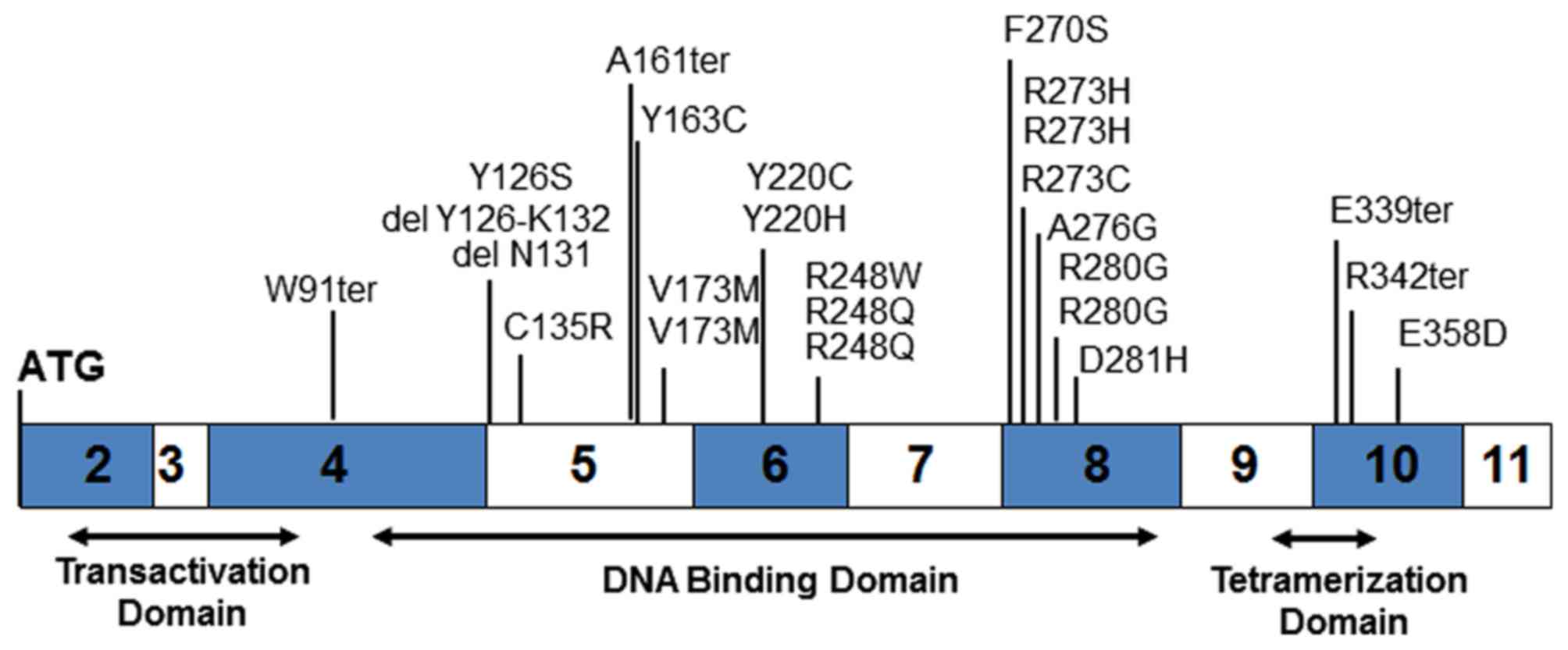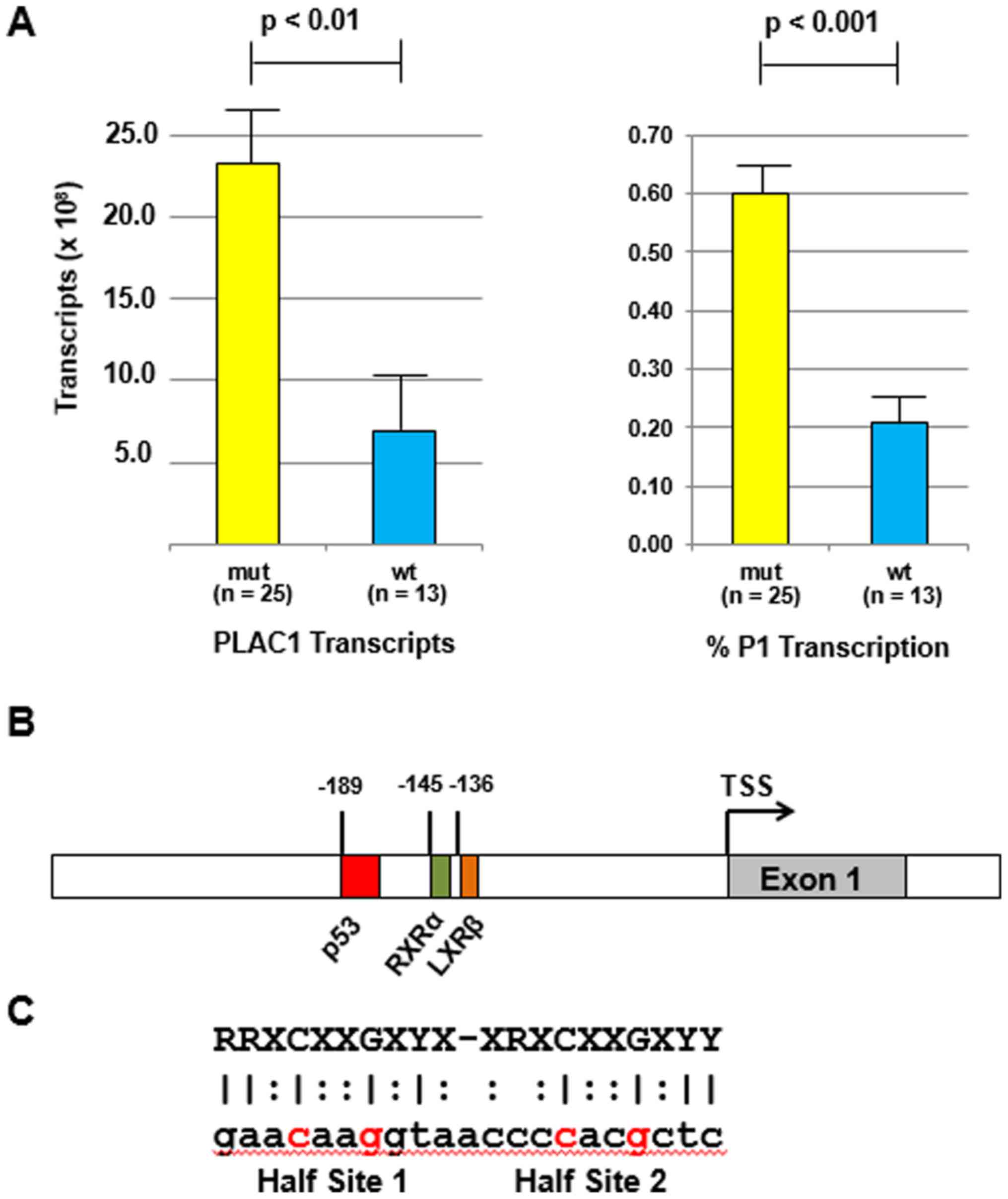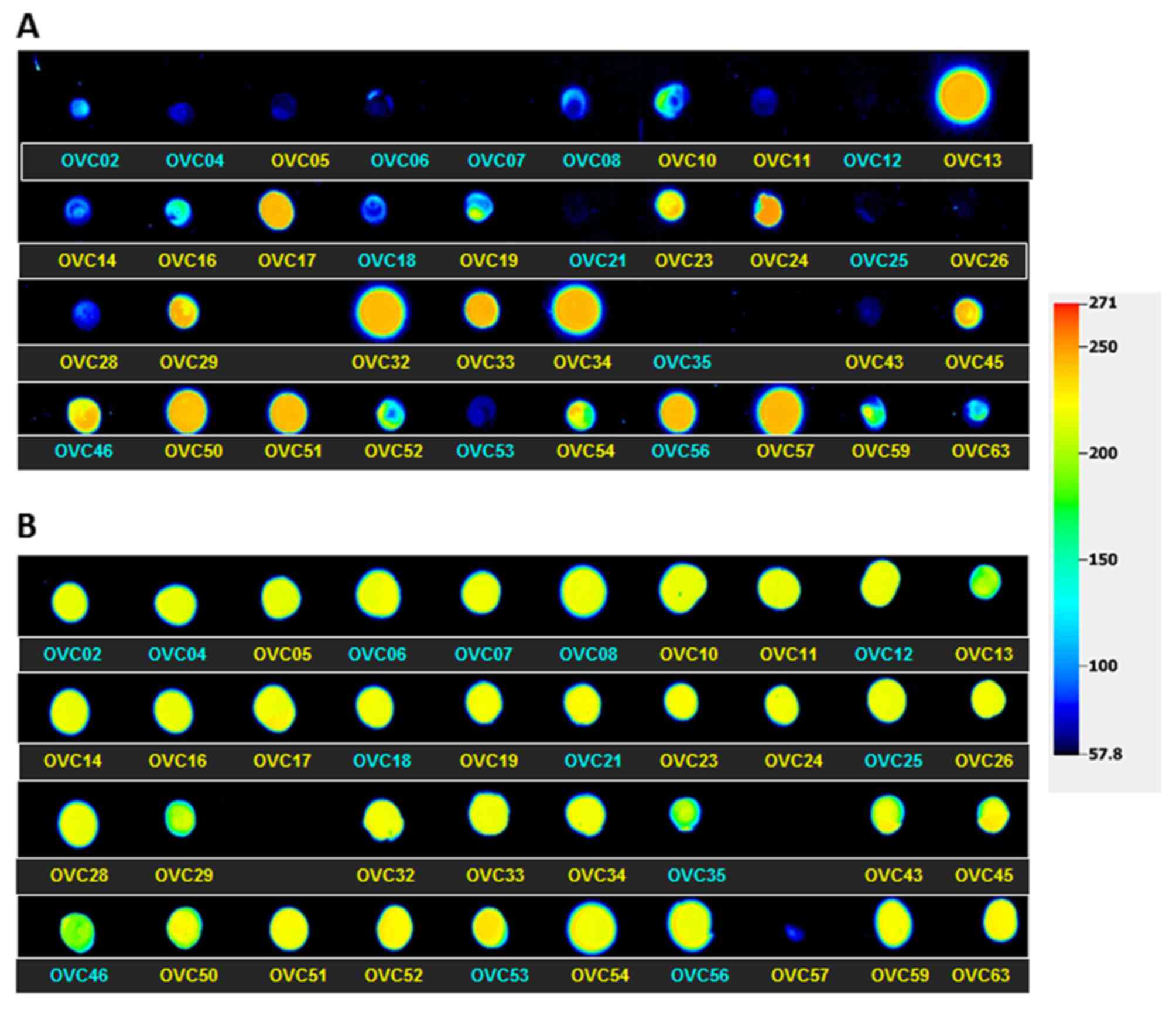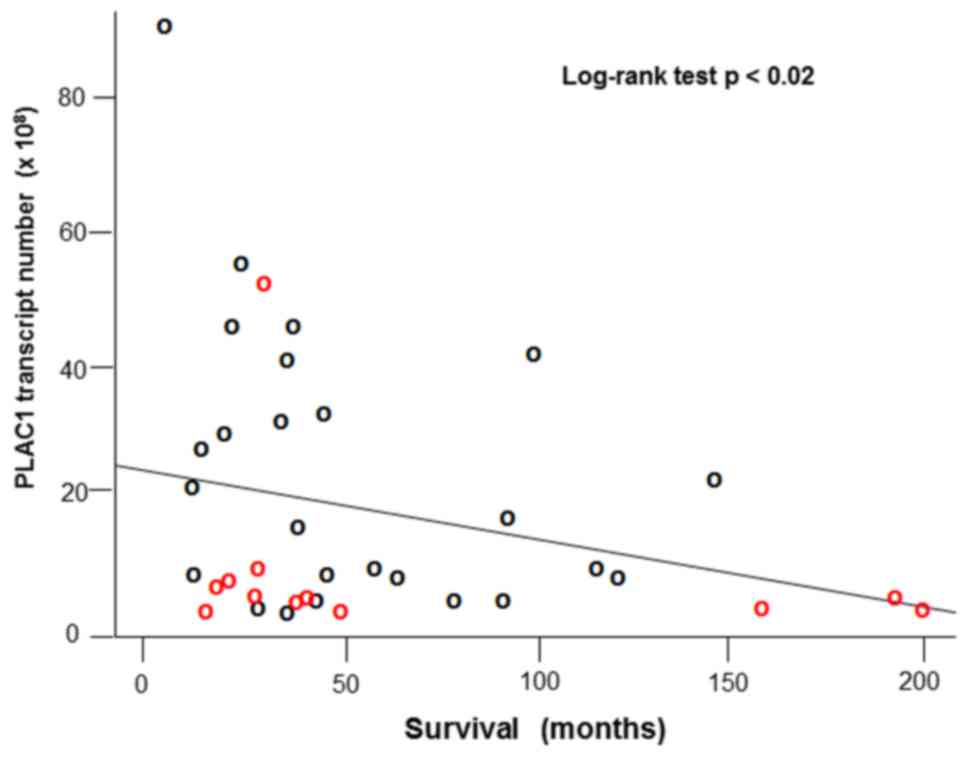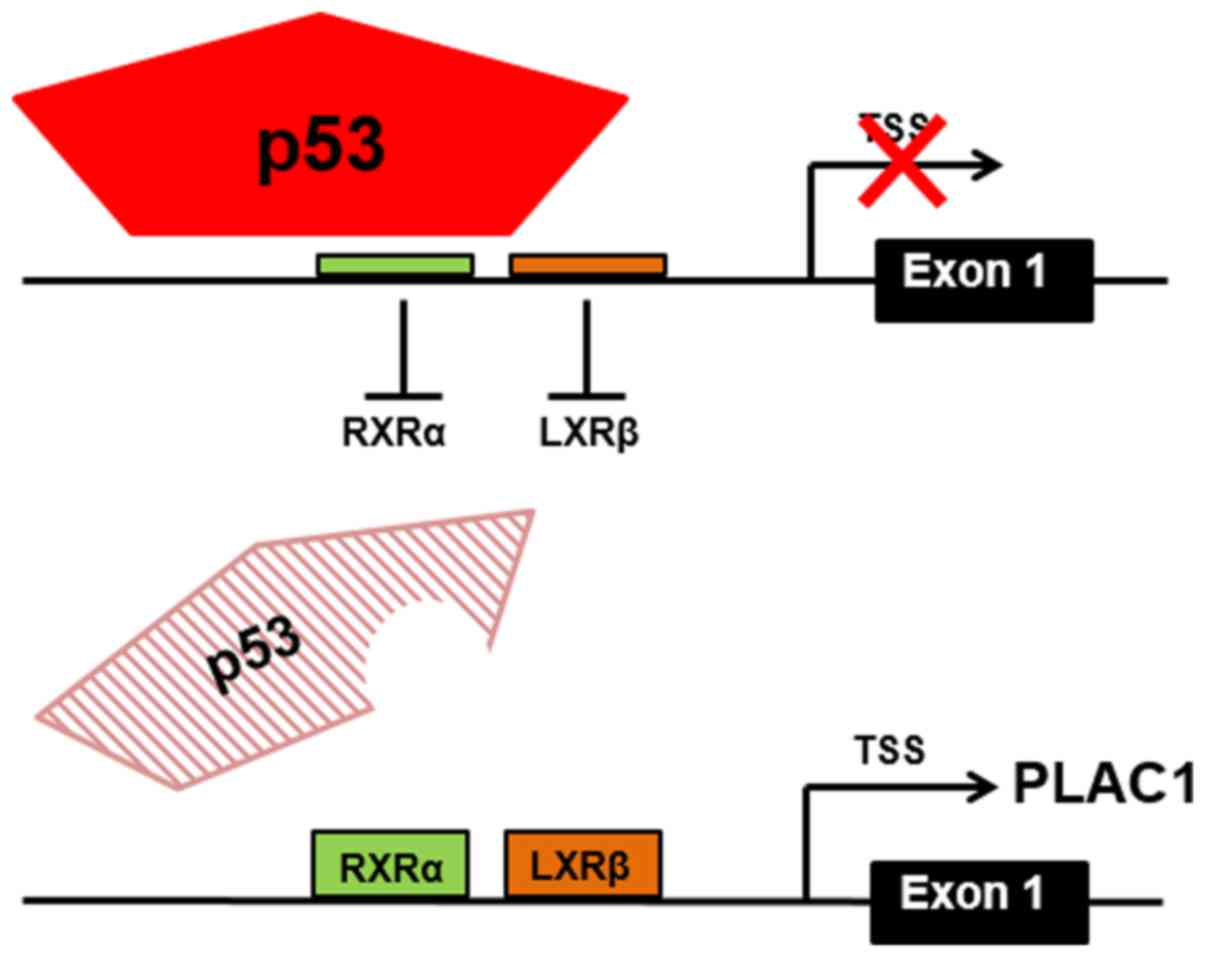|
1
|
Cocchia M, Huber R, Pantano S, Chen EY, Ma
P, Forabosco A, Ko MS and Schlessinger D: PLAC1 an Xq26 gene with
placenta-specific expression. Genomics. 68:305–312. 2000.
View Article : Google Scholar : PubMed/NCBI
|
|
2
|
Massabbal E, Parveen S, Weisoly DL, Nelson
DM, Smith SD and Fant M: PLAC1 expression increases during
trophoblast differentiation: Evidence for regulatory interactions
with the fibroblast growth factor-7 (FGF-7) axis. Mol Reprod Dev.
71:299–304. 2005. View Article : Google Scholar : PubMed/NCBI
|
|
3
|
Fant M, Barerra-Saldana H, Dubinsky W,
Poindexter B and Bick R: The PLAC1 protein localizes to membranous
compartments in the apical region of the syncytiotrophoblast. Mol
Reprod Dev. 74:922–929. 2007. View Article : Google Scholar
|
|
4
|
Devor EJ: Placenta-specific protein 1 is
conserved throughout the Placentalia under purifying selection. Sci
World J. 2014:5373562014. View Article : Google Scholar
|
|
5
|
Jackman SM, Kong X and Fant ME: Plac1
(placenta-specific 1) is essential for normal placental and
embryonic development. Mol Reprod Dev. 79:564–572. 2012. View Article : Google Scholar : PubMed/NCBI
|
|
6
|
Chang W-L, Yang Q, Zhang H, Lin H-Y, Zhou
Z, Lu X, Zhu C, Xue LQ and Wang H: Role of placenta-specific
protein 1 in trophoblast invasion and migration. Reproduction.
148:343–352. 2014. View Article : Google Scholar : PubMed/NCBI
|
|
7
|
Chen J, Pang X-W, Liu F-F, Dong X-Y, Wang
H-C, Wang S, Zhang Y and Chen WF: PLAC1/CP1 gene expression and
autologous humoral immunity in gastric cancer patients. Beijing Da
Xue Xue Bao. 38:124–127. 2006.In Chinese. PubMed/NCBI
|
|
8
|
Koslowski M, Sahin U, Mitnacht-Kraus R,
Seitz G, Huber C and Türeci O: A placenta-specific gene ectopically
activated in many human cancers is essentially involved in
malignant cell processes. Cancer Res. 67:9528–9534. 2007.
View Article : Google Scholar : PubMed/NCBI
|
|
9
|
Silva WA Jr, Gnjatic S, Ritter E, Chua R,
Cohen T, Hsu M, Jungbluth AA, Altorki NK, Chen YT, Old LJ, et al:
PLAC1 a trophoblast-specific cell surface protein, is expressed in
a range of human tumors and elicits spontaneous antibody responses.
Cancer Immun. 7:182007.
|
|
10
|
Dong X-Y, Peng J-R, Ye Y-J, Chen H-S,
Zhang L-J, Pang XW, Li Y, Zhang Y, Wang S, Fant ME, et al: Plac1 is
a tumor-specific antigen capable of eliciting spontaneous antibody
responses in human cancer patients. Int J Cancer. 122:2038–2043.
2008. View Article : Google Scholar : PubMed/NCBI
|
|
11
|
Liu F-F, Dong X-Y, Pang X-W, Xing Q, Wang
H-C, Zhang HG, Li Y, Yin YH, Fant M, Ye YJ, et al: The specific
immune response to tumor antigen CP1 and its correlation with
improved survival in colon cancer patients. Gastroenterology.
134:998–1006. 2008. View Article : Google Scholar : PubMed/NCBI
|
|
12
|
Tchabo NE, Mhawech-Fauceglia P, Caballero
OL, Villella J, Beck AF, Miliotto AJ, Liao J, Andrews C, Lele S,
Old LJ, et al: Expression and serum immunoreactivity of
developmentally restricted differentiation antigens in epithelial
ovarian cancer. Cancer Immun. 9:62009.PubMed/NCBI
|
|
13
|
Devor EJ and Leslie KK: The oncoplacental
gene placenta-specific protein 1 is highly expressed in endometrial
tumors and cell lines. Obstet Gynecol Int. 2013:8078492013.
View Article : Google Scholar : PubMed/NCBI
|
|
14
|
Devor EJ, Reyes HD, Santillan DA,
Santillan MK, Onukwugha C, Goodheart MJ and Leslie KK:
Placenta-specific protein 1: A potential key to many
oncofetal-placental OB/GYN research questions. Obstet Gynecol Int.
2014:6789842014. View Article : Google Scholar : PubMed/NCBI
|
|
15
|
Ghods R, Ghahremani MH, Madjd Z, Asgari M,
Abolhasani M, Tavasoli S, Mahmoudi AR, Darzi M, Pasalar P,
Jeddi-Tehrani M, et al: High placenta-specific 1/low
prostate-specific antigen expression pattern in high-grade prostate
adenocarcinoma. Cancer Immunol Immunother. 63:1319–1327. 2014.
View Article : Google Scholar : PubMed/NCBI
|
|
16
|
Liu F-F, Shen D, Kang X, Zhang C and Song
Q: New tumor antigen PLAC1/CP1, a potentially useful prognostic
marker and immunotherapy target for gastric adenocarcinoma. J Clin
Pathol. 68:913–916. 2015. View Article : Google Scholar : PubMed/NCBI
|
|
17
|
Chen Y, Moradin A, Schlessinger D and
Nagaraja R: RXRα and LXR activate two promoters in placenta- and
tumor-specific expression of PLAC1. Placenta. 32:877–884. 2011.
View Article : Google Scholar : PubMed/NCBI
|
|
18
|
Chen Y, Schlessinger D and Nagaraja R: T
antigen transformation reveals Tp53/RB-dependent route to PLAC1
transcription activation in primary fibroblasts. Oncogenesis.
2:e672013. View Article : Google Scholar : PubMed/NCBI
|
|
19
|
Kandoth C, McLellan MD, Vandin F, Ye K,
Niu B, Lu C, Xie M, Zhang Q, McMichael JF, Wyczalkowski MA, et al:
Mutational landscape and significance across 12 major cancer types.
Nature. 502:333–339. 2013. View Article : Google Scholar : PubMed/NCBI
|
|
20
|
Santillan MK, Leslie KK, Hamilton WS,
Boese BJ, Ahuja M, Hunter SK and Santillan DA: 'Collection of a
lifetime: A practical approach to developing a longitudinal
collection of women's healthcare biological samples'. Eur J Obstet
Gynecol Reprod Biol. 179:94–99. 2014. View Article : Google Scholar : PubMed/NCBI
|
|
21
|
Smith PK, Krohn RI, Hermanson GT, Mallia
AK, Gartner FH, Provenzano MD, Fujimoto EK, Goeke NM, Olson BJ and
Klenk DC: Measurement of protein using bicinchoninic acid. Anal
Biochem. 150:76–85. 1985. View Article : Google Scholar : PubMed/NCBI
|
|
22
|
Joerger AC and Fersht AR:
Structure-function-rescue: The diverse nature of common p53 cancer
mutants. Oncogene. 26:2226–2242. 2007. View Article : Google Scholar : PubMed/NCBI
|
|
23
|
Wang B, Xiao Z and Ren EC: Redefining the
p53 response element. Proc Natl Acad Sci USA. 106:14373–14378.
2009. View Article : Google Scholar : PubMed/NCBI
|
|
24
|
Devor EJ: Placenta-specific protein 1
(PLAC1) is a unique onco-fetal-placental protein and an
underappreciated therapeutic target in cancer. Integr Cancer Sci
Therap. 3:479–483. 2016. View Article : Google Scholar
|
|
25
|
Brachova P, Thiel KW and Leslie KK: The
consequence of oncomorphic TP53 mutations in ovarian cancer. Int J
Mol Sci. 14:19257–19275. 2013. View Article : Google Scholar : PubMed/NCBI
|
|
26
|
Blagosklonny MV: p53 from complexity to
simplicity: Mutant p53 stabilization, gain-of-function, and
dominant-negative effect. FASEB J. 14:1901–1907. 2000. View Article : Google Scholar : PubMed/NCBI
|
|
27
|
Lane DP: Cancer p53 guardian of the
genome. Nature. 358:15–16. 1992. View
Article : Google Scholar : PubMed/NCBI
|
|
28
|
Freed-Pastor WA and Prives C: Mutant p53:
One name, many proteins. Genes Dev. 26:1268–1286. 2012. View Article : Google Scholar : PubMed/NCBI
|
|
29
|
Allen MA, Andrysik Z, Dengler VL, Mellert
HS, Guarnieri A, Freeman JA, Sullivan KD, Galbraith MD, Luo X,
Kraus WL, et al: Global analysis of p53-regulated transcription
identifies its direct targets and unexpected regulatory mechanisms.
eLife. 3:e022002014. View Article : Google Scholar : PubMed/NCBI
|
|
30
|
Brachova P, Mueting SR, Carlson MJ,
Goodheart MJ, Button AM, Mott SL, Dai D, Thiel KW, Devor EJ and
Leslie KK: TP53 oncomorphic mutations predict resistance to
platinum- and taxane-based standard chemotherapy in patients
diagnosed with advanced serous ovarian carcinoma. Int J Oncol.
46:607–618. 2015.
|
|
31
|
Rinn JL and Huarte M: To repress or not to
repress: This is the guardian's question. Trends Cell Biol.
21:344–353. 2011. View Article : Google Scholar : PubMed/NCBI
|















